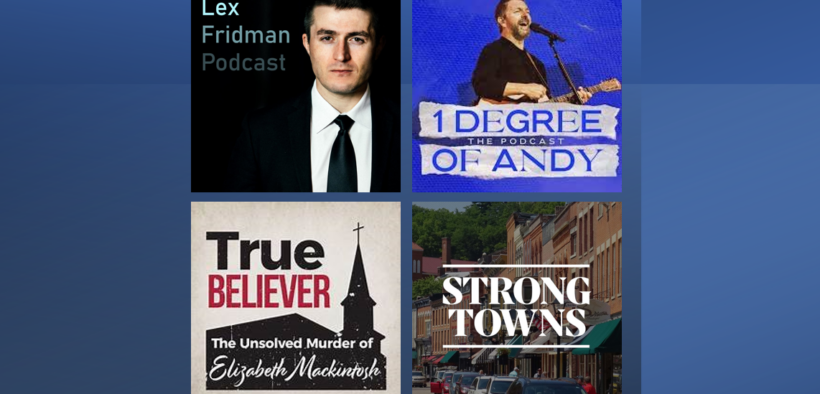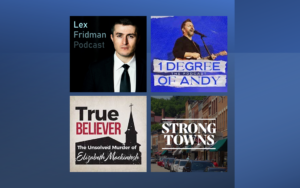EDITOR’S NOTEBOOK: Listening In On The World
Uri Berliner, NPR, and podcasts I recommend, from Andy Chrisman to Lex Fridman

Editor’s Note: Most Saturdays we will feature this “Editor’s Notebook” column. MinistryWatch President Warren Smith will offer his opinion on stories in the week’s news or, sometimes, offer a behind-the-scenes look at how and why we do what we do.
A remarkable event happened this week in the media world. Long-time National Public Radio producer Uri Berliner wrote a scathing expose of his employer. He riffed on the title of the network’s flagship program and accused it of not “considering all things.” Instead, he says, the network represents “the distilled worldview of a very small segment of the U.S. population.”

The thesis of Berliner’s article is likely not news to you, and it certainly was not news to me. In fact, in 2013 I helped Marvin Olasky prepare the 25th anniversary edition of his classic 1988 book Prodigal Press: The Anti-Christian Bias of the American News Media. We explore many of the ideas Berliner does. We mention NPR in that book.
Berliner’s critique packs a special punch, though, because of his status as an NPR insider. Though NPR has never been a bastion of conservative thought, he is right to note that something has changed in recent years. He says that in 2011, “26 percent of listeners described themselves as conservative, and 37 percent as liberal. By 2023 the picture was completely different: only 11 percent described themselves as…conservative, and 67 percent…said they were…liberal.”
APRIL 16 UPDATE: Uri Berliner was suspended with pay from NPR for publishing this article. Read more here.
I do not know if the shift Berliner describes is cause or effect. Did NPR’s liberal bias drive away conservatives or did the increase of microtargeting we are seeing in the media ecosystem cause NPR to “double down” on its niche. I do not know.
But my own experience reflects that change. I used to be an avid NPR listener. Today I am not. I have, over the years, become friends with (or at least acquaintances of) several NPR reporters, producers, and researchers, some of whom are committed Christians. Those friends are now gone.
Part of the reason for these changes is technological. The rise of podcasts means that we have a much wider variety of listening choices than we did even a decade ago. As recently as a few years ago, when I got in my car, I turned on the local NPR affiliate. Today, I plug in my iPhone and listen to a podcast.
Access to MinistryWatch content is free. However, we hope you will support our work with your prayers and financial gifts. To make a donation, click here.
But that’s dangerous, too. If I am not careful, I’ll end up in an echo chamber of my own design. C.S. Lewis wrote that “the gates of hell are locked from the inside.” He meant that people in hell choose to be there. The same could be said of the media ecosystem we inhabit. Neil Postman (analyzing Aldous Huxley’s Brave New World) warned us that it is not what we hate that threatens to destroy us, but what we love. It has become too easy to despise organizations such as NPR, The New York Times, and other legacy media organizations and fail to see – or too readily forgive — the limitations and biases of the media organizations we love.
That’s why in media, as in other areas of life, a balanced menu is the best approach. So from time to time, I’m going to devote an “Editor’s Notebook” column to some podcast recommendations that might help you get a more balanced audio diet. Here we go:
Lex Fridman Podcast. The host of this podcast is something of a polymath. He has a Ph.D. in engineering, and his podcast got its start interviewing scientists in 2006, the earliest days of podcasting. Today, it has over 3.5 million subscribers (and I’m one of them) and he still interviews scientists, but he also interviews influential figures in media and the arts. His interviews often run more than two hours in length, and occasionally make news – such as his widely quoted interview with Kanye West. I should also note that some of his interviews are rated PG-13 (at least). Here’s a pro-tip if you are going to listen: he spends nearly 10 minutes on his sponsors near the beginning of the program. Don’t listen to these every week, because there is a sameness to them, but do listen every once in a while. They are among the most unusual commercial spots you will ever hear. Recent guests have included Elon Musk and Jeff Bezos.
Strong Towns. Chuck Marohn is a former engineer and city planner who is now on a crusade to reform how urban areas work so we can create “strong towns.” Marohn is a practicing Catholic, and if you are a student of the “human flourishing” movement that is growing in certain corners of evangelical and Catholic communities (think: Tim Keller’s Every Good Endeavor and the Institute for Faith Work and Economics, the Sagamore Institute, and others), you will like the Strong Towns podcast. (By the way, I interviewed Chuck Marohn for my recently cancelled “Listening In” podcast. You can hear it here.)
One Degree of Andy. Andy Chrisman spent decades in the Christian music business in the 80s, 90s, and early 2000s as the soaring tenor voice for the groups Truth and – most notably — 4Him. Today he’s a worship leader at a church in Oklahoma, and this podcast is a conversation with his friends and fellow road warriors about their careers in what he calls the “golden age” of Christian music. Chrisman’s interview style is not journalistic. Don’t expect “60 Minutes” style questioning, or a deep dive into the underbelly of the CCM scene. That said, Chrisman is transparent and vulnerable and likeable, and that style encourages his guests to do likewise. The conversations are often raw and insightful. He and his guests don’t shy away from tough issues, including divorce, mental health issues, money issues, life on the road, and more. Recent guests include: Mac Powell, Geoff Moore, March Schultz, Wayne Kirkpatrick, and Phil Keaggy.
True Believer: The Unsolved Murder of Elizabeth Mackintosh. Early on the morning of March 26, 1990, Elizabeth Mackintosh was murdered on the campus of Covenant Theological Seminary, the flagship seminary of the Presbyterian Church in America (PCA). The murder was never solved, and this podcast is a fascinating look at the investigation and the key people involved. It also has a lot to say about the PCA and evangelicalism in general. It’s WAY too long. So far, the producers have dropped 15 episodes. Some of them are over an hour long. But, in fairness, the murder is still unsolved, and the cold case investigation is still open. Also, since the podcast started, more people have come forward to have their voices heard, so it would likely have been impossible to know how it was going to end from the beginning, which is an essential element if you are wanting to craft a tight narrative. All in all, this podcast doesn’t rise to the level of the “Serial” true crime podcasts, or of Christianity Today’s “The Rise and Fall of Mars Hill,” but it’s definitely worth listening to if you are a fan of either of those.
I hope you find these suggestions interesting and challenging. If you have some suggestions of your own, please email me: wsmith@ministrywatch. I’m always ready to try something new!



